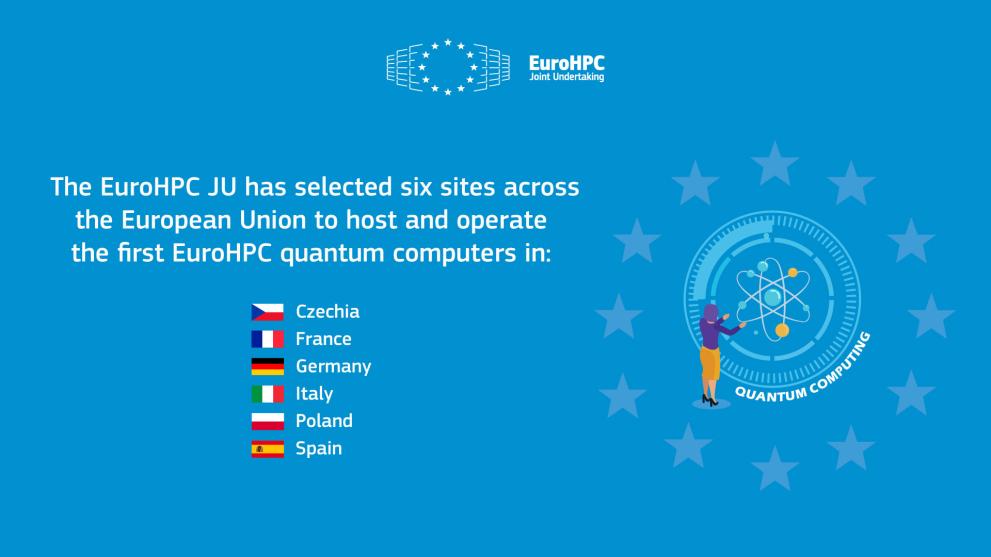
These new systems will be available primarily for R&D purpose to a wide range of European users, no matter where in Europe they are located, to the scientific communities, as well as to industry and the public sector. The selected proposals ensure a diversity in the quantum technologies and architectures to give European users access to many different quantum technologies.
This quantum computer infrastructure will support the development of a wide range of applications with industrial, scientific and societal relevance for Europe, adding new capabilities to the European supercomputer infrastructure. Across industry and scientific communities, there is an array of important computing tasks that classical supercomputers struggle to solve. Examples of such complex problems include the optimisation of traffic flows and fundamental numerical problems in chemistry and physics for the development of new drugs and materials. This is where quantum computing can help and open the door to new approaches to solve these hard-to-compute problems. The integration of quantum computing capabilities in HPC applications will enable scientific discoveries, R&D and new opportunities for industrial innovations.
The quantum computers will be integrated in already existing supercomputers and the selected hosting entities will operate the systems on behalf of the EuroHPC JU. The quantum computers will be co-funded by the EuroHPC JU budget stemming from the Digital Europe Programme (DEP) and by contributions from the relevant EuroHPC JU participating states. The JU will co-fund up to 50% of the total cost of the quantum computers with a planned total investment of more than EUR 100 million. The exact funding arrangements for each system will be reflected in hosting agreements that will be signed soon.
More information
The hosting entities have been selected as a result of a call for expression of interest for the hosting and operation of European quantum computers integrated in HPC supercomputer, launched in March 2022.
In December 2021, the EuroHPC JU launched its first quantum computing initiative with its R&I project HPCQS. The project aims to integrate two quantum simulators, each controlling about 100+ quantum bits (qubits), in two already existing supercomputers:
- the supercomputer Joliot Curie of GENCI, the French national supercomputing organisation, located in France;
- the JUWELS supercomputer of the Jülich Supercomputing Centre, located in Germany.
HPCQS will become an incubator for hybrid quantum-supercomputing that is unique in the world. Hybrid computing, blending the best of quantum and classical HPC technologies will unleash new innovative potential and prepare Europe for the post-exascale era.
Related links
- The Czech Republic will host the European LUMI-Q quantum computer, press release from IT4Innovations, one of the selected hosting entities.
- European quantum computer to come to Bavaria, press release from the Leibniz Supercomputing Centre (LRZ), one of the selected hosting entities.
- BSC, selected to host one of the first European quantum computers, press release from the Barcelona Supercomputing Centre (BSC), one of the selected hosting entities.
- CINECA OSPITERÀ UNO DEI PRIMI SEI COMPUTER QUANTISTICI EUROPEI, press release from CINECA, one of the selected hosting entities.
- The EuroQCS-France consortium led by GENCI/CEA was selected by EuroHPC to host and operate a photonic quantum computer, press release from EuroQCS-France
- One of the first quantum computers produced in Europe to be launched in Poland, press release from Poznań Supercomputing and Networking Center, one of the selected hosting entities
- EU deploys first quantum technology in six sites across Europe, press release from the European Commission
Background
The EuroHPC JU is a legal and funding entity created in 2018 to enable the EU and EuroHPC participating countries to coordinate their efforts and pool their resources with the objective of making Europe a world leader in supercomputing. The mission of the EuroHPC JU is:
- to develop, deploy, extend and maintain in the EU a federated, secure hyperconnected supercomputing, quantum computing, service and data infrastructure ecosystem;
- to support the development and uptake of demand-oriented and user-driven innovative and competitive supercomputing and quantum computing systems based on a supply chain that will ensure the availability of components, technologies and knowledge;
- and, to widen the use of that supercomputing and quantum computing infrastructure to a large number of public and private users.
To date the EuroHPC JU has already procured eight supercomputers, located across Europe: LUMI in Finland (which ranks number 3 in the world), Vega in Slovenia, MeluXina in Luxembourg, Discoverer in Bulgaria, Karolina in the Czechia, LEONARDO in Italy, MareNostrum5 in Spain, and Deucalion in Portugal.
Details
- Publication date
- 4 October 2022
- Author
- European High-Performance Computing Joint Undertaking